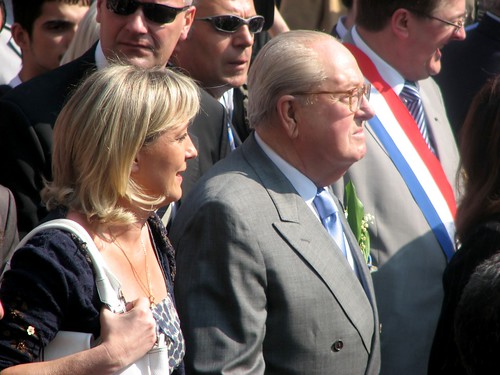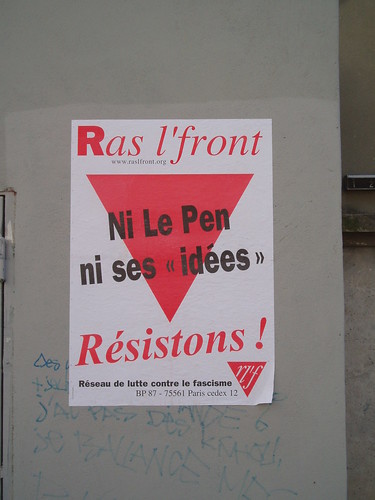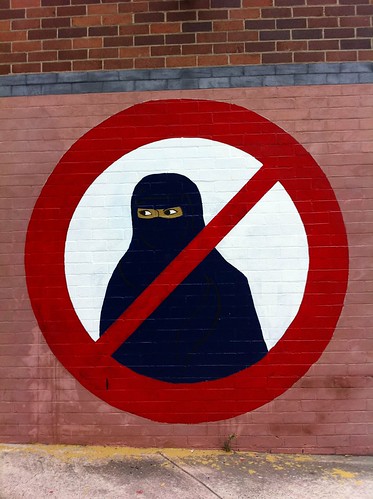Over the past few years, there has been an incredible rise in popularity of the far-right in several European countries, including Belgium, Austria, Denmark and Italy. This is also the case for France, where recent election opinion polls show Marine Le Pen, the leader of the far-right Front National, as the runner-up of the 2012 presidential elections.
 from The Economist, May 9 2011
from The Economist, May 9 2011
Le Pen fille has an edge that her father, Jean-Marie Le Pen – founder and leader of the party from 1972 to 2011 – never did. A younger, smoky-voiced, charismatic speaker, the aspiring presidential candidate has modernized her father’s extremist discourse, replacing anti-Semitic hate speech with talks on the “Islamization” of French culture. For critics, she’s difficult to pin down as she seamlessly blends traditional images and ideals from both the Left and the Right. By simultaneously critiquing capitalism and the private sector on the one hand, and promoting isolationism and a “separate-but-equal” type welfare system for the French and non-French, Le Pen is appealing to a whole new section of French society. And it’s pretty terrifying.
 Marine Le Pen and her father, Jean-Marie Le Pen by manu_le_manu (Flickr)
Marine Le Pen and her father, Jean-Marie Le Pen by manu_le_manu (Flickr)
Her success is undoubtedly helped by President Sarkozy’s plummeting popularity ratings and a hoard of leftist candidates who have been around for decades and are squirming to stand out as different. But it’s the context more than anything else that has made her a rising star. In a time of global economic insecurity and perceived social unrest, Marine Le Pen has become a viable candidate not just for old white people – the traditional FN voters – but for more and more youth and people of color. Her tactic rests on fear-mongering, “us against them” rhetoric and anti-elitism as well as promises of making the nation great again, all things that resonate strongly with people in times of insecurity.
1. Immigrant-bashing
With a lingering recession, a slow recovery and an unemployment rate hovering at 9%, targeting immigrants as responsible for economic woes has worked like a charm, particularly in older working class areas and regions that have been hit hardest by the crisis (many non-white). For many young people as well, blaming immigrants can be appealing when the youth unemployment rate has risen above 20% in the past few years (and in more deprived areas it’s at 45%!).
Marine Le Pen’s call for an end to ‘open-door’ immigration policies is not only to prevent people from coming in and “taking our jobs” and “draining our resources” (for lies on immigration see my latest blogpost here) it’s part of a larger isolationist agenda to make France economically self-sufficient. As such, Le Pen vows to stop the flow of unwanted labor and bring industrial jobs back to France by closing the borders – nevermind the realities of isolationism, which would include a major shock to the economy, and the shelving of many democratic principles.
 Anti-Le Pen poster in Grenoble, France.
Anti-Le Pen poster in Grenoble, France.
It reads “Neither Le Pen nor her ideas. Let’s resist!”
Made by an anti-fascist collective. Photo by russca (Flickr)
2. Flag-waving
Marine’s popularity also comes hot off the heels of a huge (and very ugly) national “debate” on French national Identity. White conservative rhetoric was used to marginalize and stigmatize people of color, particularly the large population of North African descent residing in France, seen as not incarnating contemporary ideals of French citizenship. This debate was legitimized by a more global discussion on the “failure of multiculturalism”, taken on by many mainstream European leaders such as Angela Merkel, David Cameron and Nicholas Sarkozy.
3. Islamophobia and the defense of secularism
Perhaps most importantly, Marine Le Pen’s popularity can probably be single-handedly attributed to the rise of anti-Muslim sentiment since 9/11. Her racist narrative on the “invasion” of Arabs and the “Islamization of French culture” are only legitimized by the West’s “war on terror” led by the U.S. More interesting perhaps, the language used is one of “defending secularism” which is sacrosanct to both the Left and Right in France. The banning of the veil in public places for example, is viewed by most as upholding a secular State, implemented during the Revolution, and not as singling-out a group of people. As such, Marine Le Pen can disguise outright racist addresses as being egalitarian.
 By BeauGiles (Flickr)
By BeauGiles (Flickr)
While most people agree that Marine Le Pen will not succeed in becoming President (this time around), her racist rhetoric is being adopted by more people on the left and on the right. She’s shifting the entire debate and the consequences of this are dire. Equality, diversity, democracy, and attempts to combat racism and discrimination are increasingly under threat. We must at all costs take anti-racist stands and defend the rights of all people to live and work free of discrimination and fear.
The biggest truth? In insecure times, xenophobia and racism prevail, fear-mongering is a politician’s best friend and suddenly the crazies don’t sound crazy to a lot of people anymore.
For more on the rise of the far right in Europe, check out a great article by K Biswas here.

Did it occur to you, in your self-righteous posture of political correctness, that perhaps Marine Le Pen might genuinely want to see a France that can stand up strong for its secular values, and not a France where entire roads are routinely blocked off by huge Muslim prayer displays?
Did you ever consider that it’s not always just about racism; that the desire to preserve a single unifying culture reflecting French values and traditions does not necessarily make someone an evil menace to society? That is perfectly natural to not want to see headscarves and women cloaked from head to toe everywhere in a supposedly secular country… just as certain as the Muslim nations the immigrants come from would not be expected to tolerate the reshaping of their cities to heavily feature churches and girls in short-shorts??
Why must it be racist or xenophobic for an unemployed French worker, struggling to make ends meet, to speak out against leaving the floodgates open for the mass immigration of more unskilled workers?
Why must French people accept the fact that taking care of the poor and destitute from foreign nations is just as important (if not MORE important) than taking care of their own poor and unemployed?? The Muslim communities in France and elsewhere certainly stick together… perhaps the French should stop listening to folks like you and start doing the same.